What is the best way to improve your IELTS speaking score? We researched the most popular IELTS speaking tips and tricks so you don’t have to. We’re also going to show you whether these seven tips lower your score or increase your score, so you have the confidence on IELTS Speaking test day to use them or not use them.
What is the Best Way to Improve IELTS Speaking Score?
I will show you exactly what IDP on the British Council has to say about these tips and tricks so that you know what we’re saying is true and correct. If any of these tips and tricks lower your score, I’m going to give you some advice on what to do instead, so that you can again have the confidence on IELTS Speaking test day to give the examiners what they’re looking for and improve your score.
Tip 1: Polite, Friendly, Eye Contact, Body Language
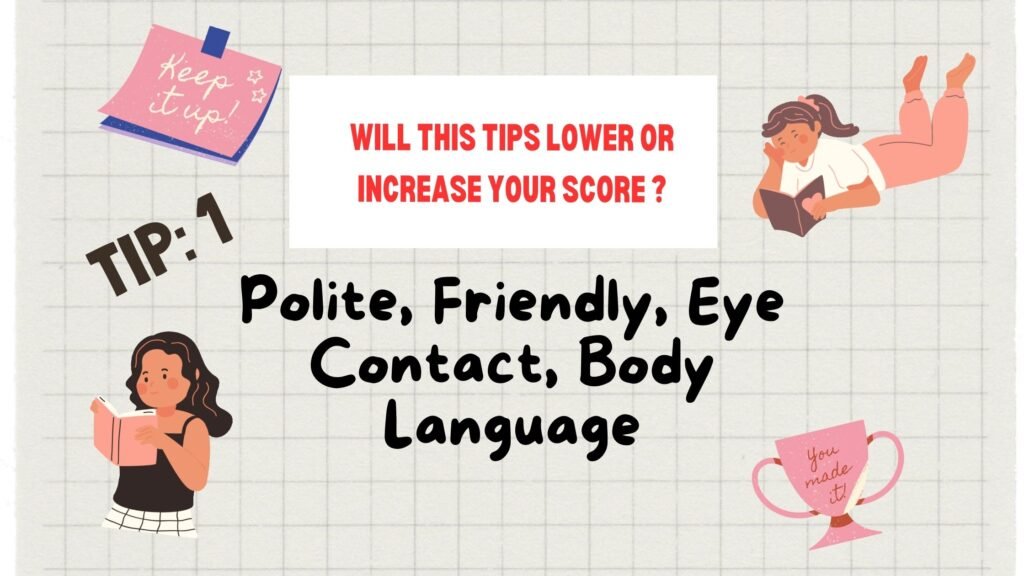
One of the most popular tips is to be polite, be friendly, and use eye contact, hand gestures, body language, and that is going to help improve your score. Is this actually correct or not?
So if you can find resources saying that it’s important to be friendly, it’s important to smile, that your body language is important, and your eye contact is important. And you’ll find thousands of videos and online blogs giving this advice.
What IDP Says:
On IDP’s website, you’ll find an article called ‘How to prepare for the IELTS speaking test,’ and in it, it says this:
‘Every examiner is trained and monitored closely to be fair to every candidate and to assess your level of English. The examiners will not give you more or fewer marks if you are smiling and laughing. It is best to try and relax as much as you can and communicate in a natural way.’

So during examiner training, the examiners are told to assess students on their speaking ability, and their speaking ability only. If you look at the official marking criteria, it doesn’t say anything about the candidate being friendly or polite, and it also doesn’t say anything about body language or hand gestures or eye contact. None of these things are actually assessed during the speaking test.
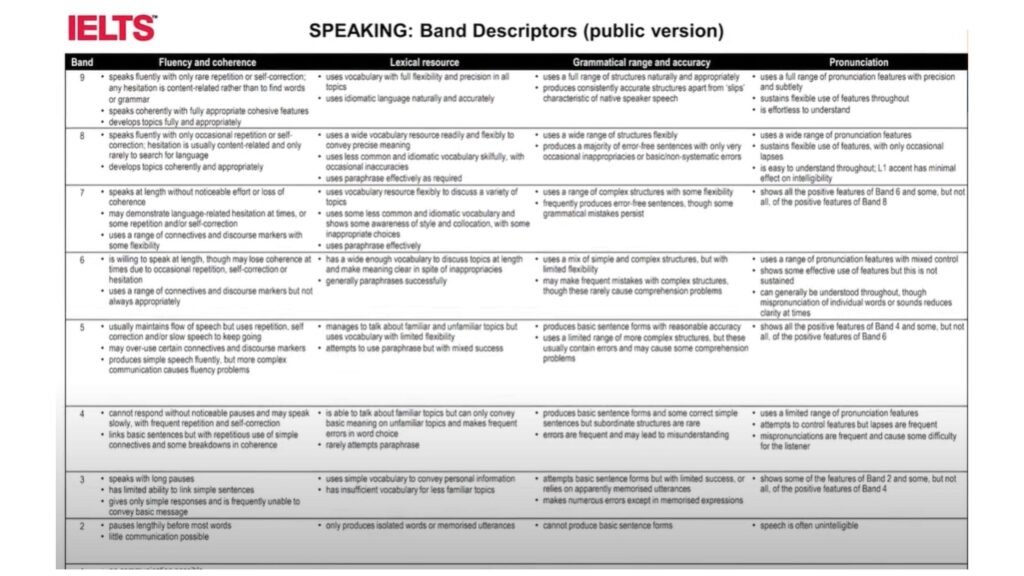
Let’s have a look at what IDP said in another article called ‘Nine myths about the IELTS speaking test to debunk.’ This is what they said:
‘Being polite, courteous, and smiling should be part of basic manners when engaging with anyone in a conversation. It does help the interaction move forward. However, it is not part of the evaluation criteria. You should not worry about being overly polite but focus on the conversation and topic at hand.’

You’ll find thousands of resources online that talk about how to greet the examiner, how to impress the examiner, the examiner’s mood, and what they think about you as a person. All of this is important. What IDP is saying is none of this is important, and none of it is actually assessed.
Conclusion:
So these tips and tricks related to being friendly, polite, body language, etc., are completely wrong. Now, you might be thinking, well, it’s not doing any harm. Well, it actually is because if you go and look at lots of the popular IELTS speaking feedback videos, those one-on-one videos, you will hear those teachers giving the students feedback on their body language and their hand gestures and their eye contact and whether they were friendly.
This means that your teacher is giving you feedback on things that do not matter, which also means that they are not giving you feedback on things that do matter because as a student, if you believe that what is important is using your hands and looking into the eyes of the examiner, it means that you are not focusing on the important things, which are fluency and coherence, grammar, pronunciation, and vocabulary. Those are the only four things that your examiner and your teacher should be thinking about because you as a student, you are not aware of what is being assessed. So if you’re listening to your teacher talking about all of these things that don’t matter, then you’re not spending enough time and not focusing on the things that do matter.
So what should you do instead?
- Only focus on what is in the marking criteria. There are things in the marking criteria that you need to spend time on and you need to work on. Body language and hand gestures are not some of those things.
- The second thing to think about is, whether is your teacher actually qualified and do they know what they’re talking about. If they are giving you feedback on these things and especially if they tell you that they are an ex-examiner, real examiners know what the test is about and what the marking criteria say. [best way to improve IELTS speaking scores]
Tip 2: Be Formal and Avoid Slang

The second popular tip that we see a lot is that the IELTS speaking test is an academic test and you need to be very academic and formal and you should avoid things like slang and informal language. Is this actually true?
You’ll find many resources like this saying that you should use formal language and don’t be informal and things like that.
What British Council Says:
So if we go on to the British Council website and have a look at an article there called ‘IELTS Test Format Explained,’ it states, ‘The content of the IELTS speaking test is the same for both the IELTS academic and IELTS General Training tests.’ And this is correct.
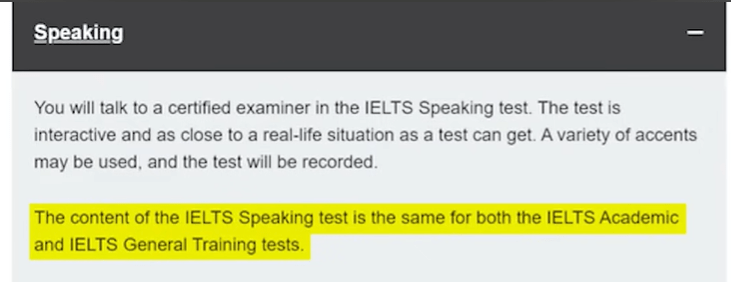
If you have a look at the official marking criteria for IELTS speaking, it is exactly the same for General Training students and for academic students. So this should be an indication that it is not an overly formal academic test.
What IDP Says:
But let’s have a look at what IDP says. A very interesting article on the IDP website is called ‘Formal and Informal English on IELTS,’ and it starts off with, ‘You wanna nine in IELTS. You might think the above sentence will give you a low score on an IELTS test. However, you might be wrong. IELTS test your English language skills, and yes, this includes both formal and informal English.’
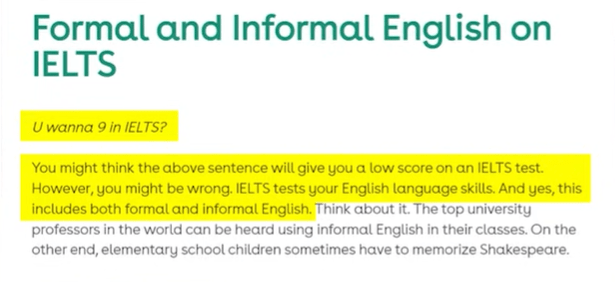
So this tip that you should not use informal English and that the test is a very formal academic test is completely wrong. The speaking test is testing your ability to speak normally in everyday situations to other people. It is actually quite rare to speak to people in a very formal academic context. I would say that less than one percent of interactions are actually really formal and academic. Therefore, it would be completely unrealistic to test people on academic formal English when the vast majority of English is normal everyday English, which includes things like slang, phrasal verbs, idiomatic language, things like that. [best way to improve IELTS speaking scores]
So what should you do instead?
- Do not learn and memorize: First of all, do not try to learn and memorize lots of academic or formal phrases and include them in your speaking test. They will sound extremely unnatural, and you will also sound very robotic.
- Relax on the test day: Secondly, relax. My number one piece of advice for students the day before their test, if a student asks me, ‘My test is tomorrow, what should I do?’ It’s, speak to the examiner like they are a human being, like they are your friend or someone you know that is going to help you relax and is helping you give the examiner what they’re looking for.
Conclusion:
Normal everyday English is also a lot simpler and easier to use, which is going to actually improve your grammar, your vocabulary, your fluency, and your pronunciation because your brain is going to be automatically relaxed, and you’re going to use words and phrases and sentences that are actually correct. If you do the opposite, and you try and remove all of this everyday English, then you’re putting too much pressure on yourself to use these overly rarely used academic phrases, and then you are going to get in trouble and make lots of mistakes. So just relax, chill out, and you will be much better off.
Tip 3: Learn More Vocabulary and Use Uncommon Words

The third most popular tip that we see for IELTS speaking is to use lots of uncommon big fancy words and memorize lists of words, and somehow these big fancy words are going to get you a high score. Is this actually true? Aaing, you’ll find lots of resources like this. For example, ‘IELTS Speaking Vocabulary: Just Eight Words to Score 7+ Bands.’ So what they are saying is, you’re going to be speaking for 15 minutes, and somehow eight of those words that you say in those 15 minutes are going to magically help you get a band seven, eight, and nine. Is this actually true?
What British Council Says:
The British Council website and look at their video called ‘Lexis and Vocabulary,’ which is all about how to use vocabulary on the IELTS test, it states, ‘Many candidates memorize impressive lists of vocabulary but often end up using them in the wrong way because they haven’t understood them properly.’
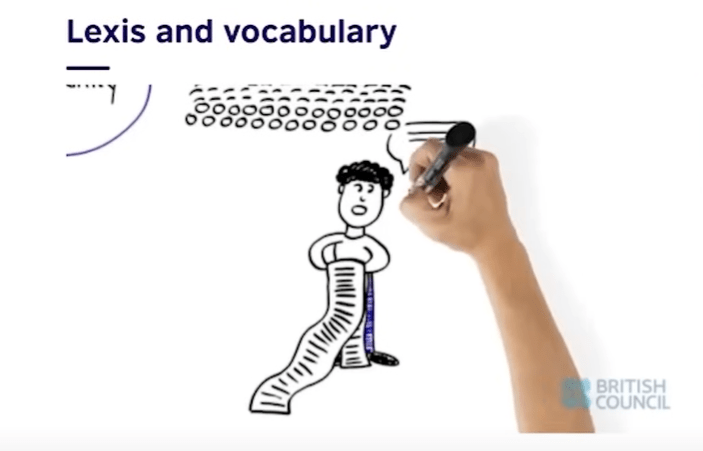
This is why you should never try and memorize lists and never try and use words you’re not comfortable using, because you’re going to make lots of mistakes, which will lower your score, not improve your score. [best way to improve IELTS speaking scores]
What IDP Says:
IDP says about this in their article ’10 Tips IELTS Speaking.’ They state quite clearly, ‘Don’t use big and unfamiliar words.’ They say, ‘You might want to impress the examiner with big and complex words in your speaking test, but to be safe, avoid using words you are not familiar with. There is a higher chance of making mistakes by either mispronouncing words or using them in the wrong context. Mistakes can affect your final band score.’

And this sums it up perfectly. This kind of resource encourages you to use big fancy vocabulary, you are actually lowering your score because you are making lots.
What should you do instead?
- Do not use new words: Well, during your preparation, you should be trying to improve your vocabulary by learning new words and phrases. But on test day, play it safe. Use the 100 rule. If you understand the word 100%—you know the meaning, you know how to use it, you know the context to use it in, and in the speaking test, you know how to pronounce that word correctly—then use it. But if you’re unsure of the meaning or you’re unsure how to use that word, or you just learned it last week, then you’re probably not using it or pronouncing it correctly. So play it safe, and you will be fine.
Conclusion:
When these kinds of resources encourage you to learn all the fancy vocabulary, that means they are telling you is your vocabulary is not good enough, you’re not good enough yet, which for the vast majority of students is incorrect.
It’s not about learning new things, it’s about unlearning, and undoing all of these bad habits. The biggest bad habit for vocabulary in the speaking test is thinking you’re not good enough and you need to learn all of these fancy words. The opposite is true. Your current vocabulary is probably fine; you’re just not using it. Not only will this affect your vocabulary score, but if you are trying to use big fancy words, then your fluency is going to suffer because you’re doing more thinking than actually just speaking naturally.
Secondly, your pronunciation score will lower because you’re making lots of pronunciation errors with unfamiliar words. Thirdly, your grammar score will also probably go down because you’re using unusual words you’re not comfortable using, which will often lead to grammar mistakes. So play it safe.
Students Also Read: Quick 8 Exercises | How can I Practice Speaking English Alone at Home
Tip 4: Learn Common Topics and Questions
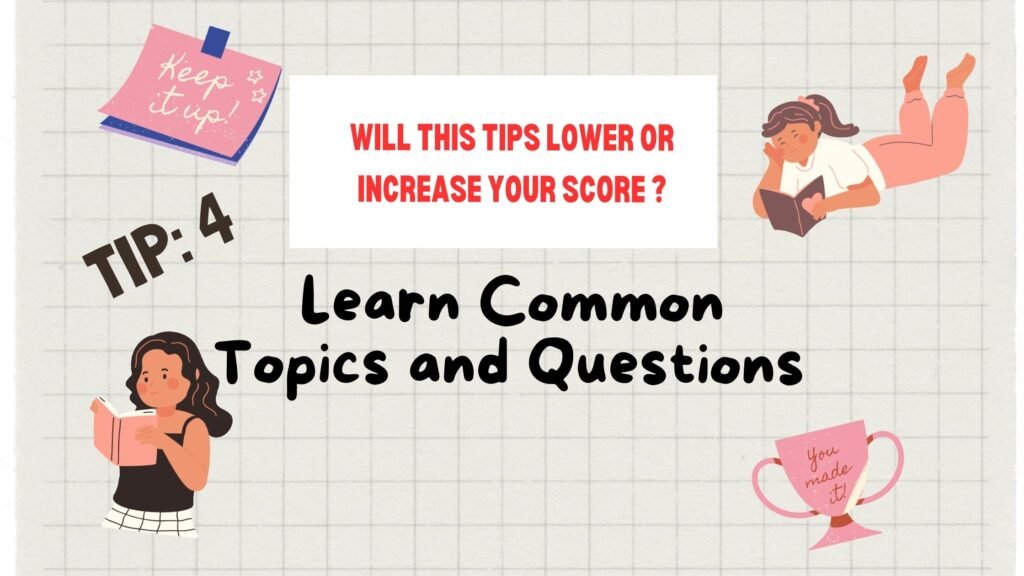
Number four, learn common topics and learn common questions. Does this actually help? From the perspective of a student, if you read or see a video called ’11 Common Questions’ or you might see a video called ’20 Common Topics’ or something, you are not an IELTS expert. So you’re going to assume that this person with more than a million subscribers knows what they’re talking about, and what you will do is you will go into the test thinking these are the questions that are going to come up. Is this actually true?
What a Blog Article Says:
So if we look at a blog article on the IELTS official website called ‘IELTS Speaking Test Topics,’ they do give examples of some questions that could come up, but they don’t give any common questions. There is a massive difference between an article giving you common questions, which you think are definitely going to come up, and example questions. Example questions are there just to give you an idea of what might come up, and this is actually correct.
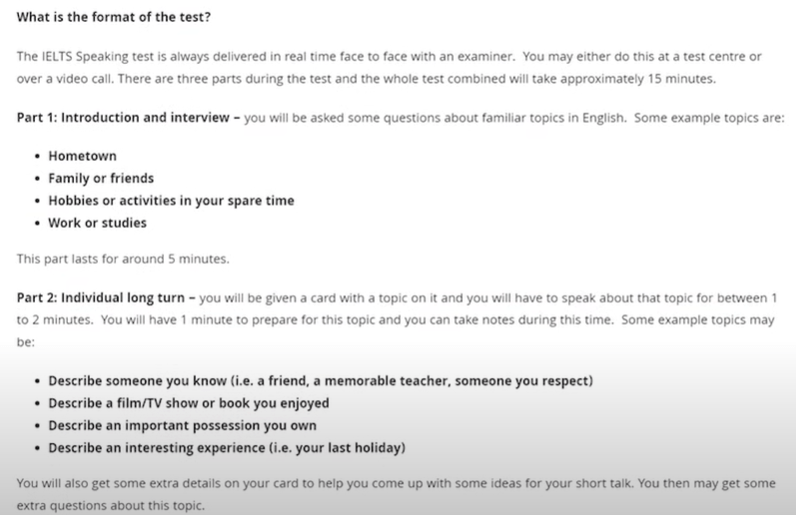
This is the best way to teach this to students, which is these things might come up, but they might not come up; you might get asked different things. This is very, very different from a video that states common questions or most common questions or most common topics.
What IDP Says:
If we go on to the IDP website, there’s an article that states, ‘In Part One, the examiner will ask you about yourself and general questions from common topics like work, family, studies, interests, and hobbies.’ This is actually true; you are likely to get a question on work, family, studies, interests, hobbies—everyday topics. But they might also, in Part One, ask you a completely random question like birthday cakes or hats or something like that. So you should not prepare for just these common questions to come up; you should expect anything to come up and be able to deal with anything. [best way to improve IELTS speaking scores]

It also says, ‘In Part Two of the speaking test, you will be given a card with a topic and asked to talk about it for two minutes. You will have one minute to prepare for your topic and a pencil and paper to draft your response.’ It doesn’t talk about common topics for Part Two because there are no common topics for Part Two. If you are preparing common topics, and common questions, you are wasting your time. Now, you might be thinking, ‘Well, there’s no harm in preparing common topics; that is the preparation that is going to help me if one of these common questions or common topics comes up.’ Well, actually, it does not, and it is actually very damaging to you and will probably lead to failure. And to explain that…”
Tip 5: Do not Memorise Phrases
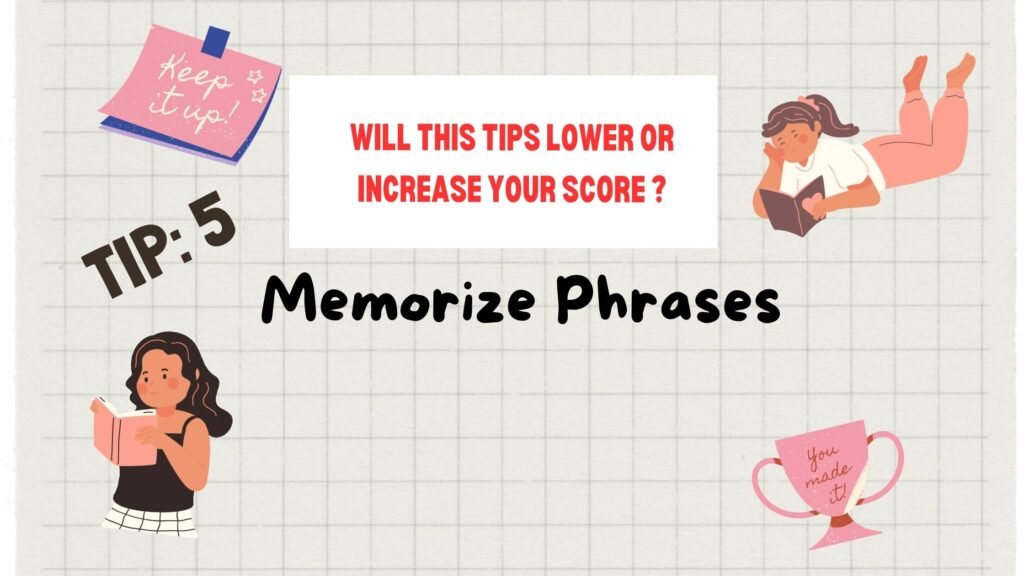
“Let’s move on to the fifth tip, which is memorize phrases, memorize sentences. And then I’ll explain how preparing common topics will actually lower your score once we go through this fifth tip – memorizing phrases.
So, you’ll find many, many resources that give you phrases. For example, they encourage you to memorize 35 phrases. So, what they exactly encourage students to think is that if you use these 35 phrases, if you memorize them, you’re magically going to improve your score. Is this actually true?
What the British Council says:
The British Council article called ‘Eight ways to boost your IELTS speaking score,’ it states, ‘While it certainly pays off equipping yourself with relevant vocabulary and common phrases and collocations, it’s important to avoid memorizing large chunks of speech. Examiners are trained to identify memorized responses and will mark you down for that. I repeat, examiners are trained to identify memorized responses and will mark you down for this.’ [best way to improve IELTS speaking scores]
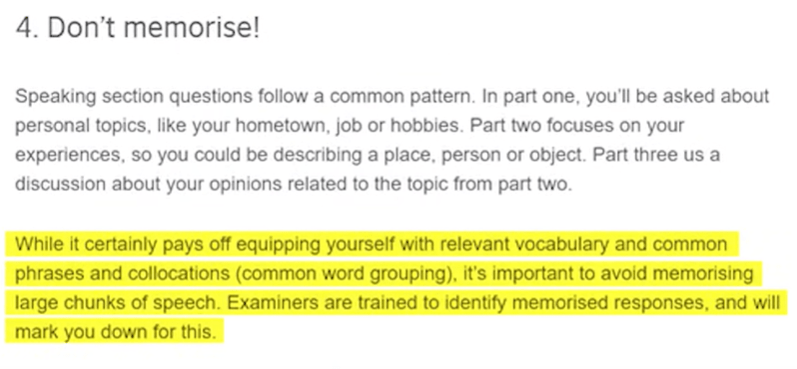
It is extremely easy for an examiner to spot the fact that you have prepared questions because you think that it’s a common question or a common topic, or you have memorized lists of sentences and lists of phrases. They are trained to do it; it is extremely easy to spot. You are not outsmarting anyone, and you are just cheating yourself because you are lowering your score.
The second thing I want you to think about is, what are the most common phrases that examiners will hear. Well, they are the phrases in the most popular YouTube videos. So, if you are watching some of these very, very popular videos with millions of views that are talking about common topics and memorized answers and memorized phrases, those are the phrases that examiners hear every single day.
For example, in part one, you have memorized a full answer for ‘Tell me about your hometown’ or ‘Tell me about your hobbies,’ and you give an amazing memorized answer. This is exactly what the examiner is going to think: ‘That person memorized that answer. Now, what I’m going to do is ask them a completely different question on a completely different topic that they were not able to memorize and not able to prepare for.’ So they might ask you something about pens: ‘Do you use pens? What do you use pens for? Have you ever bought an expensive pen? What do you think about people who buy luxurious pens made of precious metals?’ So, you’ve gone from a prepared answer to talking about platinum, precious metal pens. [best way to improve IELTS speaking scores]
What should you do instead?
- You should get your English level and your speaking ability to the level where it doesn’t matter what question comes up. If I were to do the speaking test today and they asked me about something that I know nothing about – let’s say they ask me about Indian cooking; I’ve never been to India, I don’t really eat Indian food – I’m sure it’s lovely, I’m not criticizing Indian food in any way, but I just don’t know anything about it. But if they ask me about how to cook Indian food, I would be able to give some sort of an answer, even if it’s just something like, ‘I don’t know, I’ve never cooked Indian food before, and I visited a couple of Indian restaurants in my life, but it’s not something that I do very often.’ That is giving them an answer. They are not testing my ability or my knowledge of Indian cooking; they’re testing my ability to use words effectively, vocabulary that is grammatically correct, grammar that I can pronounce in a way that the examiner can understand, and I can do so fluently and coherently. You don’t need any knowledge or prepared answers to do any of that. So, focus on getting your grammar, vocabulary, pronunciation, and fluency to the level where it doesn’t matter what question comes up.
Conclusion:
They are going to base your score not on your memorized answer but on the answer you are not expecting because that is your real speaking level. Remember, what are they testing? They’re testing when you move to London or New York or Sydney, how are you able to speak to people in everyday normal situations? Everyday normal situation is not about ‘Tell me about your hometown’; there are going to be unexpected questions that come up. So that is your real speaking level.
Tip 6: Using Lots of Idioms or Certain Idioms Will Get You a High Score
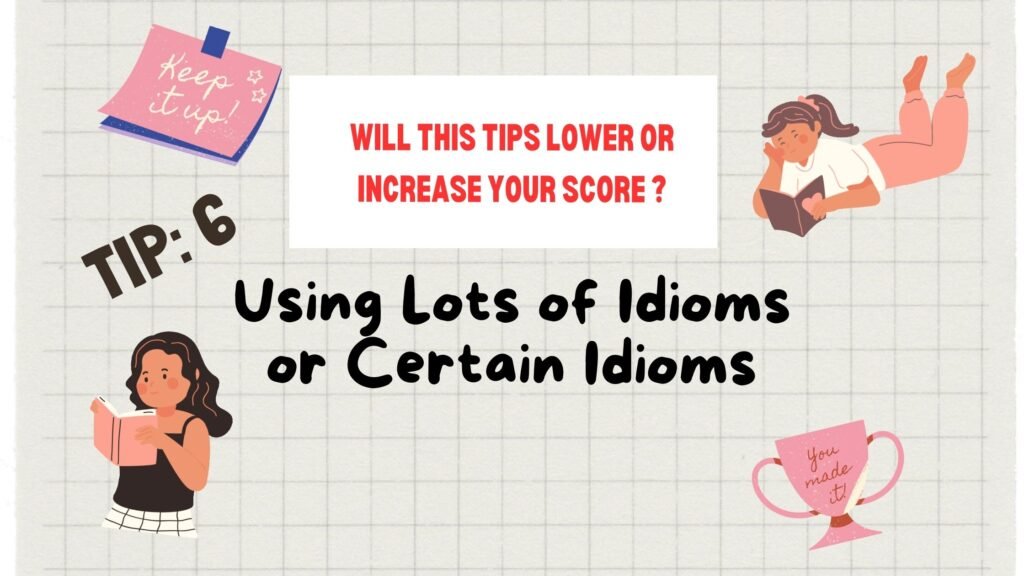
Number six is if you use lots of idioms and idiomatic language, you are going to get a high score. Certain videos even say that you have to use a specific number of idioms or specific idioms to get a high score. And really, what this comes down to is a misunderstanding of the marking criteria. [best way to improve IELTS speaking scores]
What the IELTS official marking says:
You go to the official marking criteria under lexical resource, which is vocabulary, for about seven, it says, ‘Uses some less common and idiomatic vocabulary and shows some awareness of style and collocation with some inappropriate choices.’

Learning just 7 idiomatic phrases and thinking that you will get a band seven.’ This is actually not true because idiomatic does not mean just idioms.
If we look at the definition of the word ‘idiomatic’ in Collins Dictionary, it says, ‘Idiomatic language uses words in a way that sounds natural to native speakers of the language.’
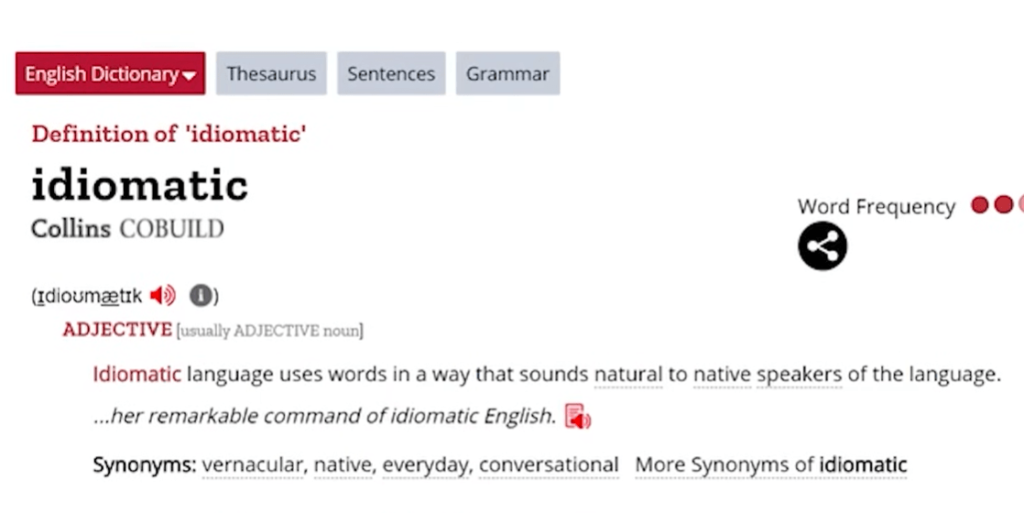
The Cambridge Dictionary definition, it says, ‘Containing expressions that are natural and correct.’
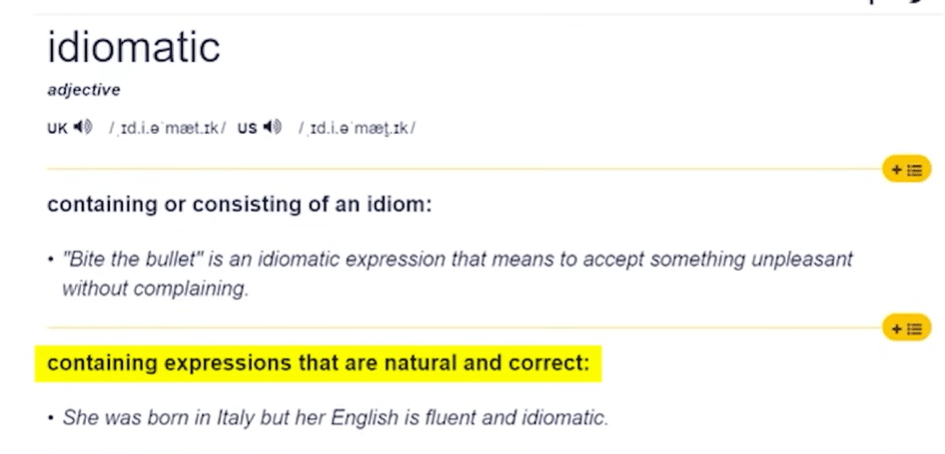
So, to summarize what idiomatic means: idiomatic means words and expressions that native English speakers would use in this context. So, that does include idioms, but it also includes phrasal verbs, and it includes slang, colloquialisms, and all sorts of things.
What official marking criteria say:
What the official marking criteria is saying is that a person at a band 7 uses some of the language that a native English speaker would use, but they don’t use it completely accurately; there are some inappropriate choices. So, band 7 students are attempting to use idiomatic language but not completely successfully.
What IDP Says:
IDP has an article on its website called ‘How to Use Idioms,’ and in it, it states, ‘In English, we use idioms and phrasal verbs to express ourselves. This idiomatic language is used frequently in our everyday communication, so it’s very important that we understand what idioms are and how to use them.’ [best way to improve IELTS speaking scores]
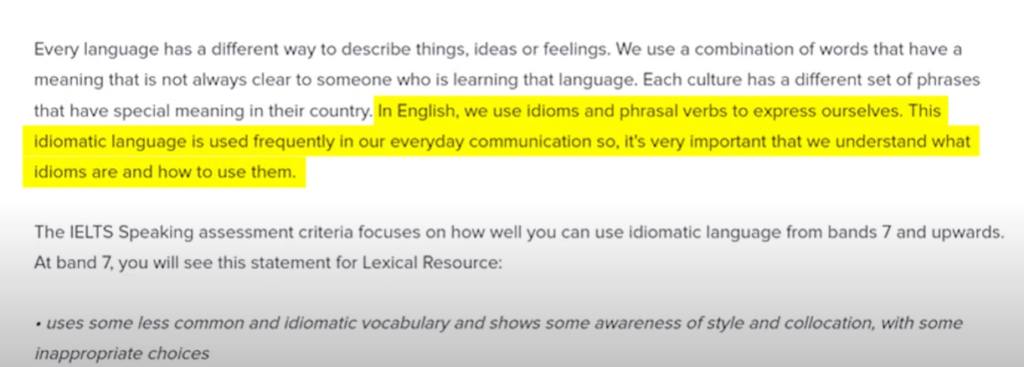
So, is this saying that just use lots of idioms, and you’ll get a high score? Well, it goes on to say this: ‘We mentioned that native speakers use idioms naturally – keyword, there – naturally.
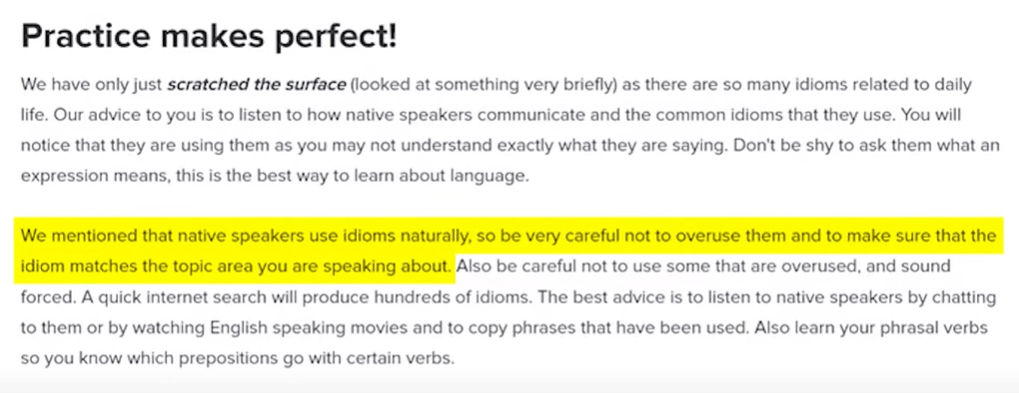
So, be very careful not to overuse them and to make sure that the idiom matches the topic area you are speaking about. Using seven idioms in 15 minutes is extremely unnatural, and I guarantee that the seven idioms that you see in a video are not going to be appropriate; they won’t match the topic.’
For example: You’ll often hear students say, like, you’ll ask them about a pen: ‘Do you like pens?’ ‘Oh, I am over the moon that you have asked me this question about pens.’ A native English speaker would never, ever, ever say that. You’re not demonstrating to the examiner that you know how to use ‘over the moon’ correctly; you’re demonstrating that you know what it means, but you don’t know how to use it appropriately. And they know, because they hear it every day, that you have just watched one of these videos with millions of views.
This is exactly what this article says: ‘Be careful not to use some that are overused and sound forced. A quick internet search will produce hundreds of idioms. The best advice is to listen to native speakers by chatting to them or by watching English-speaking movies and to copy phrases that have been used and also learn your phrasal verbs so you know which prepositions go with certain verbs.’ [best way to improve IELTS speaking scores]
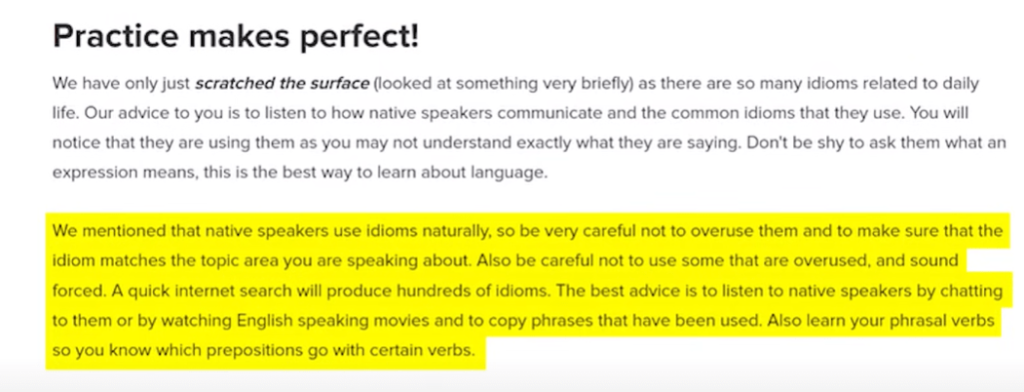
What should you do?
- Listen to Podcast: Learning lists of idioms is going to lower your score, but you should try and use some idiomatic language – language that native English speakers use – if you hope to get a band 7, 8, or 9. So, you can do two things if you’re worried about this. Get a podcast that you enjoy listening to, probably a conversational podcast with two or more people who are native English speakers talking to each other. And I want you just to listen to it and note down how many times they use idioms; it will actually be extremely rare. Then note down how many times they use phrasal verbs or slang; it’ll be a little bit more common than idioms, but they don’t use them that much. This will give you the confidence that you don’t need to go into the test and try and force this idiomatic language down the throat of the examiner.
- Do not put yourself under pressure: If you are at a band 7 level, you will naturally use idiomatic language in your speech. Don’t even try and think about it; don’t try and force it in there because if you’re truly at a 7, 8, or 9 level, you will use some of these things; you’ll definitely use phrasal verbs. But the students that are most successful go in, think about the question, and answer the question naturally as if they were not doing a test as if they were just talking to a friend or a colleague. If you do that, idiomatic language will come up, and you’ll probably use it correctly. So, don’t put yourself under so much pressure on test day. What should you do? Speak to the examiner like they’re a human being, not an idiom recording device.
Tip 7: Mentions Each Bullet Point in Part 2
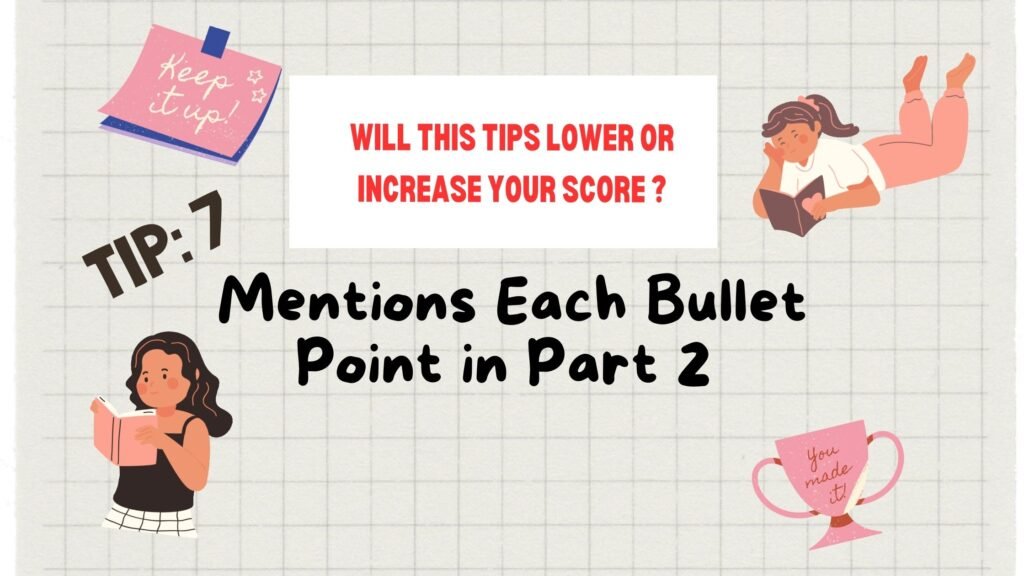
Tip number seven relates to Part Two. I want to talk about this specifically because Part Two is not only the area that students worry about the most, but they do badly because of bad advice. The most common tip and trick that I see for Part Two is that you must talk about each bullet point. And this is very, very common, and you’ll also see students being told by teachers that you must talk about this bullet point for a certain amount of time, and then the next bullet point for a certain amount of time.
What it’s encouraging you to do is point to bullet point number one, talk about that, then point to bullet point number two, talk about that, point to bullet point number three, talk about that, and then point to four, talk about that. Is this a good way to answer your Part Two question?
What IDP says:
If we look at the IDP website, it says, ‘What if I only talk about the first two bullet points in the two minutes and don’t cover all the questions?’ So, in other words, what if I don’t mention all the bullet points? And what it says here is, ‘Test takers sometimes worry that they have not covered all the points on their task card and run out of time. Remember that the examiner will interrupt you at the two-minute mark. Don’t worry if this happens, as you have already shown the examiner that you can speak at length appropriately, extending your description.’ [best way to improve IELTS speaking scores]

So, what this is saying is your job is to speak about the topic fluently for two minutes. Your job is not to speak about the bullet points or speak about them in order. The bullet points are there to help you. So, this is quite frustrating for IDP, the British Council, and Cambridge examiners because they’re using these bullet points to help you answer the question. So, if you’re uncomfortable talking about one or more of those bullet points, your fluency is really going to suffer. Also, what will happen is many students will talk about one or more of the bullet points very, very quickly. There’s nothing wrong with that because it might say, you know, talk about a pen: ‘Where did you get the pen?’ ‘My wife got it for me for Christmas.’ Like, that’s less than 10 seconds. So when students exhaust and use all of the bullet points, then they start to get nervous; they run out of time.
What should you do instead?
If you can talk about the bullet points, talk about them. But you can also talk about other things related to that topic. The only thing you need to do for Part Two is talk about the main topic on the cue card. You can mention many other things related to that topic, and my suggestion would be to pick the things that you’re most comfortable talking about. Again, and I’ve repeated myself many, many times: The goal is to show the examiner that you can speak in everyday normal situations to normal human beings. The examiner is not testing, ‘Can you talk about this bullet point, then that one, then that one, and that one?’ Because that will never, ever, ever happen in real life. So make things easy for yourself; don’t make things more difficult.
Conclusion:
Why is there so much bad advice online, especially on YouTube? Years ago, the people who originally made these videos made them without really having any expertise or experience with actually helping students improve their scores. They just threw them up on YouTube, all of them thinking, ‘Does this actually help students?’ And then new generations of IELTS YouTube gurus come along, and what they do is just copy the existing videos.
So you get a copy of nonsense, and then another copy of nonsense, and then another copy of nonsense. So it’s just a bad copy after a bad copy after a bad copy. Just because something has lots of views or your favorite YouTuber has millions of subscribers doesn’t mean that they actually know what they’re talking about. [best way to improve IELTS speaking scores]
In my opinion, not consuming these kinds of IELTS preparation resources would be the best advice and the best way to improve IELTS speaking scores.
Students Also Read: How to Think in English When Speaking | No More Translating in Your Head